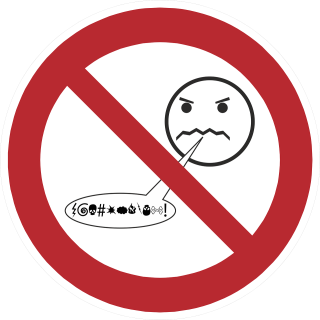Self-Talk
Cursing a Lot?
Using too much profanity can affect your mood.
Posted August 1, 2023 Reviewed by Monica Vilhauer
Key points
- Cursing may feel good in the moment, but it has a self-destructive side.
- Your use of profanity can be a good indicator of your overall stress level and mood.
- Swearing at others in an argument can be irreversibly harmful.
- Too much cursing at yourself can create negative self-talk and contribute to your poor self-image.

For 16 seasons, from 2004 to 2020, Philip Rivers was an NFL quarterback. He played 13 years for the San Diego Chargers, three years for the Los Angeles Chargers and one final year for the Indianapolis Colts. He made the Pro Bowl eight times and played in 244 games. He was known for his durability and for never having made it to the Super Bowl. He is also known as one of the all-time best trash talkers in the NFL. Rivers sounded off on everyone around him, including his opponents and their coaching staffs; referees; and even his teammates. And yet for all his jawing, Rivers never used a single curse word at any of them; not once did he ever swear.
As a devout Christian, Rivers chose words like “Rats!,” “Golly!,” “Shoot!,” and “Dadgummit!” whenever he got upset, which, if you ever watched him play, was fairly often. He was a passionate leader, in and out of the huddle, who demanded a lot from his teammates and earned the respect of his rivals. (You can find many examples of his not-so-blue language on YouTube.)
The late comedian George Carlin was best known for his set on the “Seven Words You Can’t Say on Television.” He was arrested after a concert in Milwaukee on July 21, 1972, for saying those words on stage, as he opened for folk singer Arlo Guthrie. Those words made Carlin famous, and he had a long career satirizing our discomfort with certain swear words.
Curse words exist in some form in every language on the planet. Many are derivatives of sexual acts, parts of the body, or things we all do in the bathroom each day. Linguists and lexicographers have been studying curse words and acts of swearing for centuries, and you can read many books about the origins and usages of common and unusual swear words.
Most parents cringe when their kids first learn a new curse word, especially when they use it repeatedly or at a social event in front of others. Cursing is a rite of passage for most pre-teens and teenagers, as they navigate their language and learn what they can and can’t say in front of their peers, parents, and teachers.
Not surprisingly, curse words have a lot of power, since they are used to indicate so many emotions, like anger, frustration, rage, weariness, surprise, joy, and excitement. We all have our favorite curse words, and some of our choices are a lot stronger than others. They can easily become part of our conversational habit, getting built into our conversational style as ways to express emotions in a universally understood way.
The problem comes when people develop verbal or conversational tics — like saying uh, um, like, or you know — around cursing way too much, so that it becomes noticeable, irritating for others to hear, and a hard habit to break. Worse, the profanity habit can result in people saying the wrong thing, out loud, in front of the wrong people. Cursing during a wedding toast, in front of your new boss, or in front of other people’s children are just a few examples of “Wrong Words; Wrong Time; What I Wish I Hadn’t Said.”
So, if the use of curse words is a way for most of us to vent and express ourselves about a highly negative or even a highly positive event, however brief, serious, or unimportant, can swearing also be a reliable indicator of your current mood? Can too much daily swearing put you in a bad mood, where you start to see people and events only in a negative, angry, hurtful light?
Our use of language certainly impacts our worldview and our perception of others. Do you describe certain people in your personal or professional life only by using profanity to define their personalities? Do you use curse words to create negative self-talk about yourself?
Marriage and family therapists often tell couples in conflict never to use curse words to describe each other, especially during a bitter argument. It should be a hard and firm boundary line, never to be crossed. Calling your spouse or partner a derogatory curse word — and some are way, way worse than others — is something the person hearing it may never forget. It can be intensely wounding to be called a horrible name in the middle of a bad fight. And it’s even worse if the person who said it tries to minimize the impact or denies it was said later on. The person who was cursed at will certainly remember the time, place, context of the argument, and who was wearing what clothing.
While the impact of cursing at a person you care about is certainly severe — and imagine the damage this does to a child who hears those words yelled at him or her from a parent — the role of using profanity to describe yourself, your mistakes, your failings, or any other self-judgment about your skill in getting through life, is even worse. Of all the many voices you hear throughout the day, the one inside your head is the most powerful. In most examples, some versions of light swearing about a mistake can be fairly harmless, built if what you say hurts others or yourself, it’s time to stop.
Some parents go as far as labeling a “Swear Jar” in their homes, and the adults have to contribute a dollar to it when they curse in front of their kids. Maybe that works to curtail their cursing, but it’s probably more for the ceremonial effect than actually stopping that language.
It’s never easy to stop conversational tics completely, and if swearing every few sentences has become part of your habit, it will take significant effort to catch yourself and stop, especially if there are no consequences to continuing to swear in most parts of your life. You need to see the negative impact of cursing, both for your internal and external monologues. Words matter and they affect our moods. Our constant use of swear words can create an ongoing feeling of negativity, about ourselves, the people around us, and our worldview. It may be hard to quit cursing cold turkey, but ask yourself if you can stop because it’s the right thing to do. If you do curse, make it a light word, on occasion, over a heavy-duty word.
Martin Scorsese’s 2013 film “The Wolf of Wall Street” holds the current record for most swear words in a Hollywood film at 715. There are certainly directors and screenwriters poised to break this record in their own work one day.




